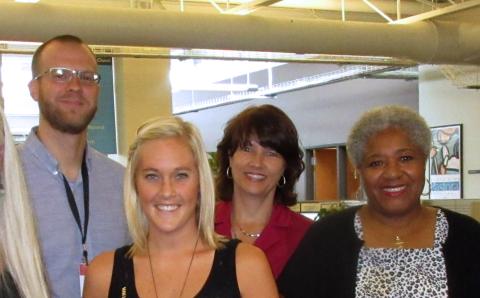Making Room
After reading the editorial “Making Room,” I am frustrated. How can we not require that people adhere to the CRC’s biblical position when appointing a new study committee? Are we going to look to culture for guidance on human sexuality? While a biblical theology of human sexuality may not be popular, we need to follow Jesus’ example in John 4 with the woman at the well. He showed her love while calling her out of her sin. I believe the courageous thing to do is to follow what the Bible teaches.
—Bryan Boersma
Frankfort, Ill.
The editorial “Making Room” spoke of being ruled by fear—a fear of change and social anxiety. I disagree that the decisions at synod were ruled by that type of fear. Much prayer and searching God’s Word was done, with the realization of how important these decisions are to the foundations of our fear. Rather, I experienced a biblical fear as described in Deuteronomy 10:12-13: “Fear the Lord your God. . . .”
It is my prayer that our church continue to be guided by this holy, reverent fear.
—Keith Dick
Falmouth, Mich.
Re “Making Room”: As the mother of a gay son, the information in this editorial makes me angry. Where is the love and acceptance for everyone that Jesus so forcefully demonstrated? Synod needs to come off of their legalistic “high horse.”
—Carolyn Vrieling
Salmon Arm, B.C.
The editorial “Making Room” brands “unnecessarily harsh and invasive” synod’s adoption of a minority report recommendation on same-sex marriage. Interim editor Vander Zee questioned whether synod assumes there is room for only one biblical and acceptable response to issues of marriage and same-sex attraction when such issues concern personal conscience. I believe Vander Zee is not merely asking for others’ views to be heard but rather that others’ interpretation of Scripture should become acceptable faith teaching.
—Joe A. Serge
Oshawa, Ont.
It is not very helpful when the editor of The Banner points out his disagreement with synod rather than help direct the denomination to the adopted minority study report (“Making Room”), which says, “It cannot be repeated enough that all people are to be welcomed into participation in worship and other aspects in the life of the church.” Let’s build on that statement when we worship and are being convicted of our brokenness and plead for God’s mercy. The good news is that he will pardon those who come to him with repentant hearts.
—Hans Visser
Taber, Alta.
Many of us share Len Vander Zee’s concern that binds officebearers in the CRC to choose between accepting synod’s new rules or actively participating in blessing a son or daughter at his or her same-sex wedding in defiance of those rules (“Making Room”). Perhaps the need for such rules is rooted in a legitimate fear of another schism within our denomination. I share that fear. However, I also know that Christ does not call us to be afraid but rather to trust that he is more than capable of cleansing his body. All of us are offered unconditional acceptance, whatever our sins.
I hope next year’s synod will see fit to undo this prohibition on officebearers. We need our same-sex-attracted brothers and sisters to be part of us. I pray that all can feel welcomed to any CRC and be who and what we are, without feeling we have to hide from each other in order to belong.
—Judy Cook
Ancaster, Ont.
Doctrine of Discovery
I was glad to hear synod rejected the Doctrine of Discovery as heresy (“Synod 2016 Rejects Doctrine of Discovery as Heresy.” But I want people of the CRC to know that not all Native people agree that we were invaded and abused. [Missionaries at Rehoboth] shared the gospel and love of Christ. I am a Christian, I am Navajo, and I attend First Navajo CRC in Thatchi, New Mexico. I know that I am forgiven and will rejoice with Christ one day because of the love shared by God’s disciples that came to the reservations.
—Tabitha Manuelito
Tohatchi, N.M.
Boarding schools, Christian and government, were the only way to educate Navajos from 1868, when the U.S. government promised to educate them (“Synod 2016 Rejects Doctrine of Discovery as Heresy”). Then and now, Navajos live in extended “camps” scattered over an area the size of Ohio. None were literate; very few could speak English. As a teacher/administrator at both Zuni and Rehoboth schools, I witnessed the difference—only proximity. Zunis are village dwellers, so kids could easily walk from home to school and back. Boarding schools are costly and difficult to operate. As dean of students at Rehoboth in the 1980s, I and others worked to gradually phase out dorms. There have been no dorm students at Rehoboth for more than 25 years
—Thomas Weeda
Grand Rapids, Mich.
What I Heard . . .
Dr. Timmermans laments an attitude of distrust between denominational leadership and local churches (“What I Heard at Synod.” He cites several causes for this mistrust but neglected to mention a key dynamic.
Several years ago a number of churches hosted a “Listening Forum” related to the Belhar Confession. A member of senior denominational leadership stated that he wanted to hear our thoughts and then talked for over an hour, leaving only 15 minutes for our input.
The next year our church hosted an event with one of the denominational offices to discuss how churches should do justice. But as the group shared their opinions, the leaders ended discussion, choosing instead to tell us what they felt we should know. In both cases, people left feeling that the denominational leadership felt they had all the answers and we simply needed to be instructed.
Rebuilding trust and working together is vital. Yet it goes both ways. Churches must learn to trust the leadership, but the leadership must recognize that it exists to serve the church.
—Robert Toornstra
Salem, Ore.
Ministry Shares
If synod wants the Board of Trustees to overhaul ministry shares, I recommend that they look at Classis Grand Rapids East’s overture to Synod 2007, which was adopted and later rescinded (“Synod Rejects Ministry Shares Increase.” If they need an idea, I recommend my Banner article of 13 years ago advocating a synodical tithe (“Consider a Synodical Tithe”). Perhaps the moment has finally arrived for these calls for change.
—Scott K. Ritsema
Grand Rapids, Mich.
From Cornfields to Conflict Zones
I enjoyed reading about Ida Kaastra-Mutoigo (“From Cornfields to Conflict Zones” but found it “corny” that there wasn’t a photo of her. In the future, I would love to see who I am reading about.
—Lisa Thomson
Frankfort, Ill.
Thanks!
Len Vander Zee has led us faithfully by navigating our “ship of grace” through uncharted waters (“From the Voice to the Voices” —avoiding collisions on rocky shores of liberalism on many diverse viewpoints, from literal reading of the Bible to theistic evolution to the soul-wrenching debate on homosexualism. We pray that [new editor] Shiao Chong will also lead Banner readers with the message of shalom.
—George Lieuwen
Langley, B.C.
150th Anniversary
The June 2016 Banner [cover] was very interesting. But I missed the cover from the 1930s. It was a knight with armor. My parents let me color [the Banner covers] first and then brought it next door to our neighbor every Sunday. They in trade gave us De Wachter.
Good memories! Thanks for The Banner and all who make it possible.
—Mary Ann Wiersma
Whitinsville, Mass.
I am reading the June 2016 issue of The Banner and thought I would tell you how much I enjoy reading The Banner. It is an excellent publication with news and updates, encouraging stories, and spiritually informative and uplifting articles.
—Tony Sneep
Edmonton, Alta.
Faith Stories
During WWII, I grew up in a family of 13 children. War was hard on many families, but I find it hard to believe that a father would find it too dangerous to stop and speak to his son (“The Power of Our Faith Stories” whom he had not seen for six months. There were times of bombings and lack of food, and it was risky to have or listen to the radio. But never too risky to express love to a family member, at least not where we lived, in Enschede.
—George Vanden Brink
Red Deer, Alta.
Millennials
I was pleased to read “Millennials: Where Do They Fit?” It contains many good suggestions [for how young people can be made to feel part of the church]. Here are a few more: Allow people in the pew to make comments and ask questions during the sermon. Young people love to discuss. Also, there is nothing wrong with giving young people jobs like serving coffee and shoveling snow. We should give them something to do. Finally, invite young people to take a more active role in the church. When we do that the church will have to change.
Twenty-somethings are not like older folk. They are far more inclined to question everything. So if we give them a voice, as the article suggests, we should be prepared to give an account of the way we do things. We can ignore their queries and continue to do church the way we always have. But then I fear we will end up being a church of old people only.
—Harry Van Belle
Edmonton, Alta.









